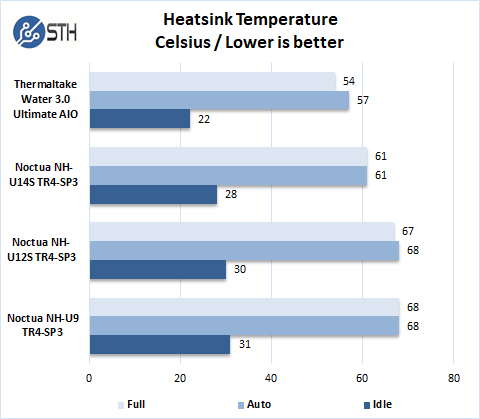Air or Liquid Cooler for AMD Threadripper 3970x?
Hi All,
I'm finishing up a build for my new workstation (Asus TRX40 pro prime mobo and AMD 3970x) and I'm going back and forth between air and liquid cooling. Talking to professional system builders like Puget, they suggest air cooling for their builds--specifically Noctua's, but I hear the 3970's run especially hot. I get where they're coming from when they say liquid coolers eventually fail---pump, hoses, etc..and the potential danger of destroying your CPU with a leak, but isn't it just as dangerous for a CPU to run around 80c+? I'm using my system for rendering 3D, After Effects work, Unreal Engine, etc.
I was initially going to reuse my "Fractal Design Celsius S36 Blackout 87.6 CFM Liquid CPU Cooler" since it's less than 3 years old and worked great on my 1950x...but maybe not the best idea. Fan noise, the bulkiness, or overall aesthetic of Noctuas isn't a factor for me as long as it sufficiently cools this beast of a chip.
Any suggestions---air or liquid?
I'm finishing up a build for my new workstation (Asus TRX40 pro prime mobo and AMD 3970x) and I'm going back and forth between air and liquid cooling. Talking to professional system builders like Puget, they suggest air cooling for their builds--specifically Noctua's, but I hear the 3970's run especially hot. I get where they're coming from when they say liquid coolers eventually fail---pump, hoses, etc..and the potential danger of destroying your CPU with a leak, but isn't it just as dangerous for a CPU to run around 80c+? I'm using my system for rendering 3D, After Effects work, Unreal Engine, etc.
I was initially going to reuse my "Fractal Design Celsius S36 Blackout 87.6 CFM Liquid CPU Cooler" since it's less than 3 years old and worked great on my 1950x...but maybe not the best idea. Fan noise, the bulkiness, or overall aesthetic of Noctuas isn't a factor for me as long as it sufficiently cools this beast of a chip.
Any suggestions---air or liquid?
Comments
-
So here's the thing. No matter which option you choose, both have their points of failures. With a traditional heatsink and fan combo, it's typically the fan. For liquid cooling units, it's fans and pumps. If your concern is longevity with minimum maintenance, then air cooling is definitely easier from that perspective. Another big factor to consider is space within the chassis, especially on quad channel configurations like Threadripper systems. You can easily use a massive air cooler like a Noctua NH-U14S TR4-SP3 or Be quiet! Dark Rock Pro TR4, but that can make installing memory pretty tedious on certain board layouts, especially if you have to troubleshoot your DIMM's in any capacity. With an AIO liquid cooler, the pump/block combo won't obstruct any DIMM slots, making that a pretty simple procedure.cccylon said:Hi All,
I'm finishing up a build for my new workstation (Asus TRX40 pro prime mobo and AMD 3970x) and I'm going back and forth between air and liquid cooling. Talking to professional system builders like Puget, they suggest air cooling for their builds--specifically Noctua's, but I hear the 3970's run especially hot. I get where they're coming from when they say liquid coolers eventually fail---pump, hoses, etc..and the potential danger of destroying your CPU with a leak, but isn't it just as dangerous for a CPU to run around 80c+? I'm using my system for rendering 3D, After Effects work, Unreal Engine, etc.
I was initially going to reuse my "Fractal Design Celsius S36 Blackout 87.6 CFM Liquid CPU Cooler" since it's less than 3 years old and worked great on my 1950x...but maybe not the best idea. Fan noise, the bulkiness, or overall aesthetic of Noctuas isn't a factor for me as long as it sufficiently cools this beast of a chip.
Any suggestions---air or liquid?
As for your concerns in regards to their relative performance, high-end air coolers do a fine job at competing with 240mm AIO's, which is what AMD recommends as the minimum requirement for their Threadripper CPU's these days. Here you can see the Noctua 140mm air cooler competing with a 360mm AIO: https://www.servethehome.com/noctua-nh-u14s-tr4-sp3-review-140mm-air-cooler-for-amd-epyc-and-threadripper/
Granted, this is with a 1950X, but it should illustrate just how close in performance high end air cooling is relative to AIO's.
For first hand user experience, a user in this thread was able to find success using a Noctua air cooler: https://community.amd.com/thread/245879#comment-2952692, however if you look at the post directly below his, another user ran into the same RAM clearance issues I mentioned before. I think from a performance perspective, you'll be fine with either option. I can't imagine you'll be able to do much overclocking/precision boost overdrive tweaking on air or on a closed loop, you may need an open loop with larger radiators and a more powerful pump to pull that off, but I think if you just want something plug & play, either one will work fine. For a list of compatible coolers, take a look here: https://www.amd.com/en/thermal-solutions-threadripper.
As for whether it's safe to run the 3970X at 80C, I'd say it would be fine. The max thermal junction temperature is 95C, and 80C is pretty far away. These processors are cut down from the EPYC processors which were designed to sit in stuffed server racks with small vapor chambers on them running 24/7, so they are designed to be pretty resilient for that kind of operation. The important things to factor in are voltage and current limitations. Avoid using excessive voltage and current if you intend to tweak your CPU's clock speed as that would be far more detrimental to the longevity of your processor to just heat alone.
If you have any additional questions, let us know.
Categories
- All Categories
- 1 The Blog
- 1 What's Trending
- 7.9K The Community
- 3.2K General Discussion
- 136 New Members
- 857 Consumer Tech
- 227 Prebuilt PCs and Laptops
- 166 Software
- 32 Audio/Visual
- 53 Networking & Security
- 4 Home Automation
- 5 Digital Photography
- 14 Content Creators
- 30 Hobby Boards & Projects
- 83 3D Printing
- 83 Retro Arcade/Gaming
- 61 All Other Tech
- 400 PowerSpec
- 2.6K Store Information and Policy
- 149 Off Topic
- 58 Community Ideas & Feedback
- 614 Your Completed Builds
- 4K Build-Your-Own PC
- 2.9K Help Choosing Parts
- 327 Graphics Cards
- 335 CPUs, Memory, and Motherboards
- 146 Cases and Power Supplies
- 54 Air and Liquid Cooling
- 49 Monitors and Displays
- 93 Peripherals
- 66 All Other Parts
- 65 Featured Categories
We love seeing what our customers build
Submit photos and a description of your PC to our build showcase
Submit NowLooking for a little inspiration?
See other custom PC builds and get some ideas for what can be done
View Build ShowcaseSAME DAY CUSTOM BUILD SERVICE
If You Can Dream it, We Can Build it.

Services starting at $149.99

